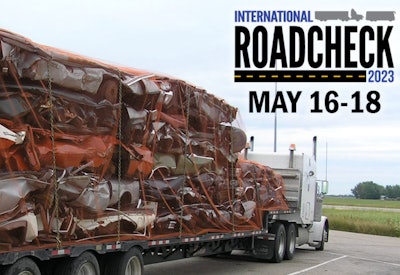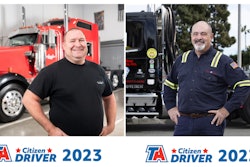
About a month from now, law enforcement agencies in the U.S, Canada, and Mexico will turn their collective attention to a mass inspection effort of commercial motor vehicles. International Roadcheck, a program of the Commercial Vehicle Safety Alliance, is scheduled for May 16-18, and during those 72 hours, thousands of commercial vehicles will be stopped and inspected.
For the uninitiated – longtime drivers who have never been stopped, and, especially, drivers new to the profession – Roadcheck may seem rather daunting, even intimidating. But, according to a man uniquely familiar with Roadcheck, the event is nothing to worry about.

During his time in law enforcement, Disbrow’s focus was on inspections including overseeing the training program for the department’s inspectors for seven years. He also was an instructor for the Federal Motor Carrier Safety Administration teaching inspectors across the country.
“I just loved it,” said Disbrow of his time as a trooper inspecting commercial vehicles. “So honestly, it was exciting to me to do inspections on trucks because it's a whole investigation on every single traffic stop. You're piecing the puzzle together and trying to figure it out. So to me, it was really exciting to pursue that avenue.”
There is a frequent – usually critical – thread on social media about Roadcheck, and CVSA’s other similar inspection events like Operation Safe Driver and Brake Safety Week. Many truckers see them as an inconvenience at best. Other less generous truckers view the concerted inspection events as unwarranted intrusions into their driving lives.
But, according to Disbrow the majority of truckers he dealt with in his time as a trooper had no problem with the inspection, and actually welcomed the interaction with him.
 Jeremy Disbrow
Jeremy Disbrow
“In fact, more often than not, I had to cut drivers off because they have no one to talk to for five days in a row, and you're a face that they can talk to. So I'd have to kind of cut 'em off after an hour and say, ‘Look, I’ve got other people I’ve got to get to.’”
During last year’s Roadcheck, North American inspectors placed 12,456 commercial motor vehicles and 3,714 drivers out of service while conducting almost 60,000 inspections. As the CVSA points out, that means the vast majority of trucks – about 80% – and drivers – some 95% – passed inspections with no issues that would have led to placing them out of service.
When he was doing inspections, Disbrow said he didn’t stop just any passing trucker. He said he looked for those with obvious issues.
“I found a lot of problems, but that was because I looked for the problem vehicles,” said Disbrow. “And you can tell when you see a truck going down the road and you see little things that they could take care of that they're not taking care of, that tells me that that person is probably going to be somebody I want to pay attention to. Because if you don't fix the little stuff, I know you're not fixing the big stuff. So, in my experience, most of the people I came into contact with had issues, but that was because I was kind of targeting those vehicles in the first place.
“If you think about it logically, if you're sitting in the median watching traffic go by at 70 miles an hour, there's not a lot you can see except for the obvious things. So things like lighting. In my state (Arizona), mud flaps are required. So mud flaps, reflective tape, those kinds of things stand out like a sore thumb.”
An emphasis in this year’s Roadcheck is anti-lock braking systems. He said problems with ABS are easily spotted.
“ABS lights stand out like a sore thumb at night, especially because you can see that light on the side of the trailer and, you know, there's a defect.”
And, what should a driver expect if a trooper stops them during Roadcheck? According to Disbrow, it’ll be nothing different than any other inspection stop. The inspector will perform a Level I inspection, which Disbrow said is the most thorough of all of the inspections. A driver should expect the Level I inspection process to take about an hour.
“If you look on the CVSA website, you can actually download the 37-step procedure, and it's done the same way throughout the entire North American continent,” said Disbrow. “It starts with choosing a safe inspection site. It works its way down through all the driver stuff, inspecting their credentials and their USDOT numbers, all that good stuff.
“And, then it moves into the vehicle components, and it's a systematic inspection. We teach everybody the same way. It starts at the front of the truck, looking at the lamps and everything at the front. And it works its way counterclockwise around the vehicle. And every inspector may do it in a slightly different order, but they all follow the same 37 steps. So it's a really good resource if you've never been inspected before to download that inspection procedure. And you can see exactly what they're looking at at each step.”
Disbrow pointed out that not just any issue found during the inspection is going to wind up with an out of service finding for the truck or the driver.
“Not all violations are out of service, obviously, right? But we have what are called critical inspection items, and those are what determine whether you get a CVSA decal or not. So if there's any defects found in any components of the vehicle that are critical, such as braking or tires or steering components, that will keep them from getting a decal. But there is a possibility you'll have a violation and it's not going to be out of service.”
An issue of special concern during this upcoming Roadcheck is whether the truck’s automatic braking system is working.
“ABS is real simple,” said Disbrow. “It's the same thing the driver sees every time they start their truck. All you have to do is turn the key to the on position in your ignition, and you watch the lamps on the dashboard, and you watch your trailer lamp on the trailer to make sure that they're activating.
“Any truck tractors after March of 1997, and any other vehicles, like trailers after March of 1998, have to have ABS systems. So they cycle the key on the light, turn it on just like all your other lights do, showing that it's working properly in the function check, and then it turns off by itself. If the light stays on, there's a defect. If the light doesn't turn on at all during the function check, there's a defect. And contrary to what some people think, putting duct tape over the top of the light does not fix the problem. So, that's a very simple check. If you're not seeing it turn on and turn back off, you know, you need to take it in and get it serviced.”
The other special focus during this year’s Roadcheck is load securement. CVSA said “... improper cargo securement poses a serious risk to drivers and other motorists by adversely affecting the vehicle’s maneuverability, or worse, causing unsecured loads to fall, resulting in traffic hazards and vehicle collisions.”
Inspections for load securement can be difficult as there are so many different sorts of loads. Disbrow said there are a lot of requirements that go into a properly secured load and he cites a flatbed load as an example.
“Not only do you have to make sure that your tiedowns are in good condition, but you need to make sure that you have enough tiedowns to cover not only the length of the load you're transporting, but also the weight of the load. And, in my experience, I find a lot of drivers focus on the length, because that's real easy to figure out.
“Most people just throw a strap every 10 feet, and they call it good. And that's fine for the length, but it doesn't necessarily mean you have enough for the weight. That's a little more complicated to calculate. So you need to make sure that you have enough to cover half of the weight of the cargo that you're transporting. So in other words, if you have a 20,000 pound box on the back, you need to have enough tie downs to cover 10,000 pounds or half the weight of the load.”
Disbrow said load securement in an enclosed trailer is a bit more difficult.
“You have a little more leeway when (the load is) enclosed in a van trailer,” he said. “So cargo, really what we're looking for in a van trailer is the cargo heavy enough that if it isn't secured and it rocks around inside that vehicle, is it going to penetrate a wall and come through the vehicle? Or could it tip or shift and be heavy enough that it affects the maneuverability of the vehicle? So that's really what we're looking for.”
So then, is there a secret to being stopped during International Roadcheck and getting that coveted CVSA clean inspection decal? Not really. Disbrow said it’s pretty much common sense and doing a good job with something basic to every driver, every load, every day.
“I know it sounds simple, but really the most obvious thing is just doing a proper pre-trip inspection. There's no secrets to this. We're not coming up with obscure regulations or anything. Most of it is pretty much common sense. You know what is supposed to be inspected on a pre-trip. And does that always happen? Absolutely not. So doing a proper pre-trip, making sure that you check, especially the obvious things that are going to stand out to an enforcement person, like lights, those are, are dead giveaways if you're taking care of your truck or not taking care of your truck.”
Disbrow offers this example from a Roacheck during his time as an inspector:
“Two years ago we did it in Flagstaff, Arizona, up at the 7,000-foot elevation. And the truck driver was just getting ready to go down the mountain through a very steep grade.
“We stopped him prior to the mountain checking his steering components, which are simple things, just giving a shake to the tie rod and the pitman arm and making sure everything is secure. I found out that his drag link was not secured, and it was about to fall off. The bolt had fallen out. There was nothing holding that piece on.
“So had he started going down the mountain, I'm surprised it made it as far as it did, quite frankly. But had he started going down the curvy grade there, more than likely it would've been a fatality, no question about it. He would've lost steering capabilities and gone off the road.”
So it all comes down to doing proper pre-trip inspections, checking your brakes, checking your steering components, your suspension, all those kinds of things. And, that's really not just for Roadcheck, but it's just for every day of life when you're doing your job.”
But for Disbrow, Roadcheck is not just about doing inspections and getting unsafe trucks and drivers off the road.
“I think the biggest thing that stands out to me is not really enforcement related, it's education-related,” Disbrow “At least in my state, and I know many states did the same, we set up booths. And in Arizona, in fact, we would set up booths and say, ‘You can bring us false logbooks. You can bring us whatever you want to bring us, and we'll give you advice on it and try to help you understand it with no risks. We're not gonna write you tickets for it, we're not going to give you a hard time, but if you have questions, we're here to answer 'em for you with no repercussions. So this is your chance to kind of get educated and, and have the freebie.’
“And, so usually the first driver kind of moseys up there and all the other ones stand back to see if he's going to make it out OK. And once he makes it out, then everybody follows suit.
“And, one other thing we do at Roadcheck, and I know a lot of states do, is they involve their trucking associations in the event as well. So we have mechanics and we have drivers that shadow us during inspections, and they can see what a Level I inspection looks like from start to finish. And that's a really huge benefit, I think, for education.”
Finally, what advice does Disbrow have for someone preparing for Roadcheck?
“Like I said, do a proper pre-trip inspection, make sure the vehicle is squared away. Make sure the log book is squared away and everything before they hit the inspection stations. But, again, that applies to every day of life.
“Other than that, I would say just be cooperative. Understand that you have a very high likelihood of getting pulled over. It's not because you did anything wrong. You're doing a job and the inspectors are doing a job and we're working together. So be patient, be cooperative. Don't take it offensively that you got pulled over, and just be patient. I think they'll see that their attitude dictates how the inspector is going to respond a lot of the time and vice versa. So we're working together and just build that partnership.”












